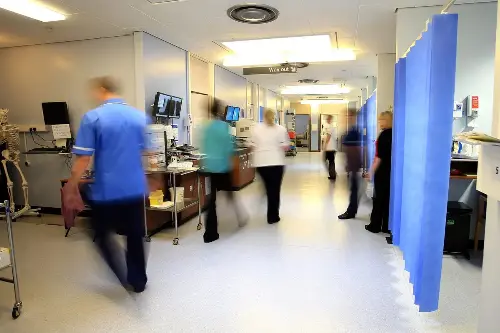
Health bosses have launched a new initiative in a bid to save more lives, urging people who believe they are having a stroke to call 999 immediately, at the very first sign of any symptoms.
The NHS campaign is an update of the Act FAST initiative - Face, Arms, Speech, Time - which teaches people to look for warning signs of a stroke including the face drooping on one side, having arm weakness or speech slurring.
Now, it has been updated to teach people to act swiftly should any single stroke symptom arise after recent data showed that Brits tend to wait on average more than an hour before calling for emergency services help. The most recent statistics show that the median time between a patient getting the first symptom of a stroke in England and calling 999 was 88 minutes.
The NHS adds that dialling 999 as soon as possible is crucial to saving lives and preventing lasting damage.
So what are the symptoms you should be watching out for? Here’s everything we know.
What is a stroke?
A stroke happens when blood stops flowing to a part of your brain. It can affect things like speech and movement, and takes a long time to recover. It can have long-lasting and devastating consequences if not dealt with quickly.
NHS England said it is most important to get help within the “golden hour” of 60 minutes, in which there is the greatest chance of saving brain tissue.
Professor Sir Stephen Powis, the national medical director for NHS England said: “These figures highlight very clearly that we must do more to support people to recognise the symptoms of stroke in themselves and others and take action to call 999 at the earliest opportunity. Stroke symptoms can be less obvious or dramatic than you might expect, but even if it doesn’t seem like it, any sign of stroke is always an emergency and it’s vital you call 999 immediately.”
The new study on waiting times to call for help was carried out after looking at data from the Sentinel Stroke National Audit Programme (SSNAP) at King’s College in London.
Experts looked at the records from 41,327 of the 60,307 stroke patients in England in 2023-24 who were taken into hospital via ambulance, and looked at the information on these records which showed when the very first symptoms were noticed by the patient.
NHS England then conducted further research which found, after polling a total of 2,001 adults in England, that 57 per cent believed people should have “two or three symptoms of a stroke before calling 999”. In fact having, just one is a sign of a serious medical emergency.
Dr David Hargroves, NHS England’s national clinical director for stroke and a consultant stroke physician, added “When someone has a stroke, it’s estimated they may lose about 2m brain cells a minute, which is why rapid diagnosis and treatment is critical. The first sign of a stroke might not seem like much, but face or arm or speech, at the first sign it’s time to call 999.
“Thanks to greater awareness of the symptoms and advances in NHS care, more people are now surviving a stroke than ever before, but there is much more to do help save lives and reduce the long-term impact of strokes. Acting ‘FAST’ remains vital – whether it is a friend, loved one or even a passerby, dialling 999 quickly saves lives.”
What are the symptoms?
The NHS says symptoms often start very suddenly. Strokes are typically seen in older people, but it can happen at any age.
People are told to watch for their faces or eyes drooping, arms becoming weak and speech becoming slurred.
Other symptoms include feeling dizzy, severe headaches and confusion.
But symptoms can also differ drastically between men and women. Some women do not show typical symptoms:
What are the additional stroke symptoms women should watch out for?
Women can display symptoms subtle enough to be missed or brushed off in the daily juggle of work-life balance.
Symptoms can be different for women and can include fatigue, confusion and general weakness as opposed to weakness specifically on one side.
Nausea, brain fog, hiccups, shortness of breath and a change in behaviour can also be signs not typically associated with strokes.
How is a stroke diagnosed?
If a health professional thinks you've had a stroke, they'll do tests such as blood tests CT scans, MRI scans and ultrasound scans.
What treatment can they do if you have a stroke?
If caught quickly, doctors can work immediately on minimising the damage. Treatment in the first 24 hours could include medicine to get rid of blood clots, surgery to remove any blood clots, and surgery to stop too much pressure from building up in the brain.
Medicines to lower blood pressure are also often given, such as statins.
What are the causes of a stroke?
The NHS says that a stroke can happen at any time to anyone.
However, doctors warn that your risk could increase if you are over 50, you have sickle cell disease, you have an unhealthy lifestyle, you suffer from migraine, you take the combined contraceptive pill, or if you are pregnant and have pre-eclampsia.
A full list of those more at risk can be found here.
© The Standard Ltd
